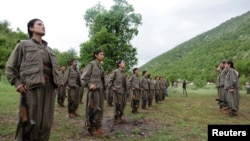ISTANBUL —
The Kurdistan Workers Party, or PKK, has announced it is suspending the withdrawal of its forces from Turkey. The Kurdish rebel group blames the Turkish government for failing to introduce pro-Kurdish reforms, but has pledged it will continue to observe a ceasefire.
The PKK announced through a website linked to the armed group that it had ended the withdrawal of its forces from Turkey to their bases in neighboring Iraq. The rebel group said it took the move because the Turkish government has failed to introduce democratic reforms as part of the peace process.
The peace process began earlier this year when Ankara initiated talks with the imprisoned PKK leader, Abdullah Ocalan. However, the Turkish government says it will only introduce reforms when the rebels withdraw all its estimated 3,000 or so fighters from Turkey.
The PKK says it will continue to respect a ceasefire. Ahmet Tan, a parliamentary deputy with the pro-Kurdish Peace and Democracy Party, says Kurds will pursue their demands through peaceful protests.
"If the government doesn't keep its promises, the answer is not taking up arms. There will instead be strikes, boycotts and rallies," said Tan.
The Turkish government was hit hard in June by widespread protests, mainly in Turkey’s western cities, over what protestors said was Prime Minister Recep Tayyip Erdogan's authoritarian manner of governing. Observers say in the fallout, Erdogan is reluctant to introduce pro-Kurdish reforms.
Turkey will hold local and presidential elections next year. Among the most contentious reforms called for by the PKK are mother tongue education and a general amnesty, both opposed by the prime minister.
Asli Aydintasbas, a columnist for the Turkish newspaper Milliyet, warns that widespread Kurdish protests could pose a threat to the government.
"They [Kurds] held a couple of demonstrations in eastern Turkey, just giving the government a hint of what they can do, which was enough to get them back to the negotiating table. Because, facing opposition on all fronts - in Istanbul, in various cities - the government does not want to open another front," said Aydintasbas.
Renewed fighting seems unlikely. Soli Ozel, an international relations professor at Istanbul's Kadir Has University, says that the coming winter will make it hard for Kurds to battle.
"Already mid-October is too late to come back to violence. And we may have actually a kind of easy time until after Newroz [Persian New Year]. After that, if really serious progress has not been made, then we may see a resumption of hostilities, violence. But, at this point, I do not see [how] a return to violence would serve the PKK purposes," said Ozel.
Newroz, celebrated every March 21, is the traditional time for the PKK to restart hostilities. But for now, Kurdish leaders are banking on peaceful protests.
The PKK announced through a website linked to the armed group that it had ended the withdrawal of its forces from Turkey to their bases in neighboring Iraq. The rebel group said it took the move because the Turkish government has failed to introduce democratic reforms as part of the peace process.
The peace process began earlier this year when Ankara initiated talks with the imprisoned PKK leader, Abdullah Ocalan. However, the Turkish government says it will only introduce reforms when the rebels withdraw all its estimated 3,000 or so fighters from Turkey.
The PKK says it will continue to respect a ceasefire. Ahmet Tan, a parliamentary deputy with the pro-Kurdish Peace and Democracy Party, says Kurds will pursue their demands through peaceful protests.
"If the government doesn't keep its promises, the answer is not taking up arms. There will instead be strikes, boycotts and rallies," said Tan.
The Turkish government was hit hard in June by widespread protests, mainly in Turkey’s western cities, over what protestors said was Prime Minister Recep Tayyip Erdogan's authoritarian manner of governing. Observers say in the fallout, Erdogan is reluctant to introduce pro-Kurdish reforms.
Turkey will hold local and presidential elections next year. Among the most contentious reforms called for by the PKK are mother tongue education and a general amnesty, both opposed by the prime minister.
Asli Aydintasbas, a columnist for the Turkish newspaper Milliyet, warns that widespread Kurdish protests could pose a threat to the government.
"They [Kurds] held a couple of demonstrations in eastern Turkey, just giving the government a hint of what they can do, which was enough to get them back to the negotiating table. Because, facing opposition on all fronts - in Istanbul, in various cities - the government does not want to open another front," said Aydintasbas.
Renewed fighting seems unlikely. Soli Ozel, an international relations professor at Istanbul's Kadir Has University, says that the coming winter will make it hard for Kurds to battle.
"Already mid-October is too late to come back to violence. And we may have actually a kind of easy time until after Newroz [Persian New Year]. After that, if really serious progress has not been made, then we may see a resumption of hostilities, violence. But, at this point, I do not see [how] a return to violence would serve the PKK purposes," said Ozel.
Newroz, celebrated every March 21, is the traditional time for the PKK to restart hostilities. But for now, Kurdish leaders are banking on peaceful protests.




